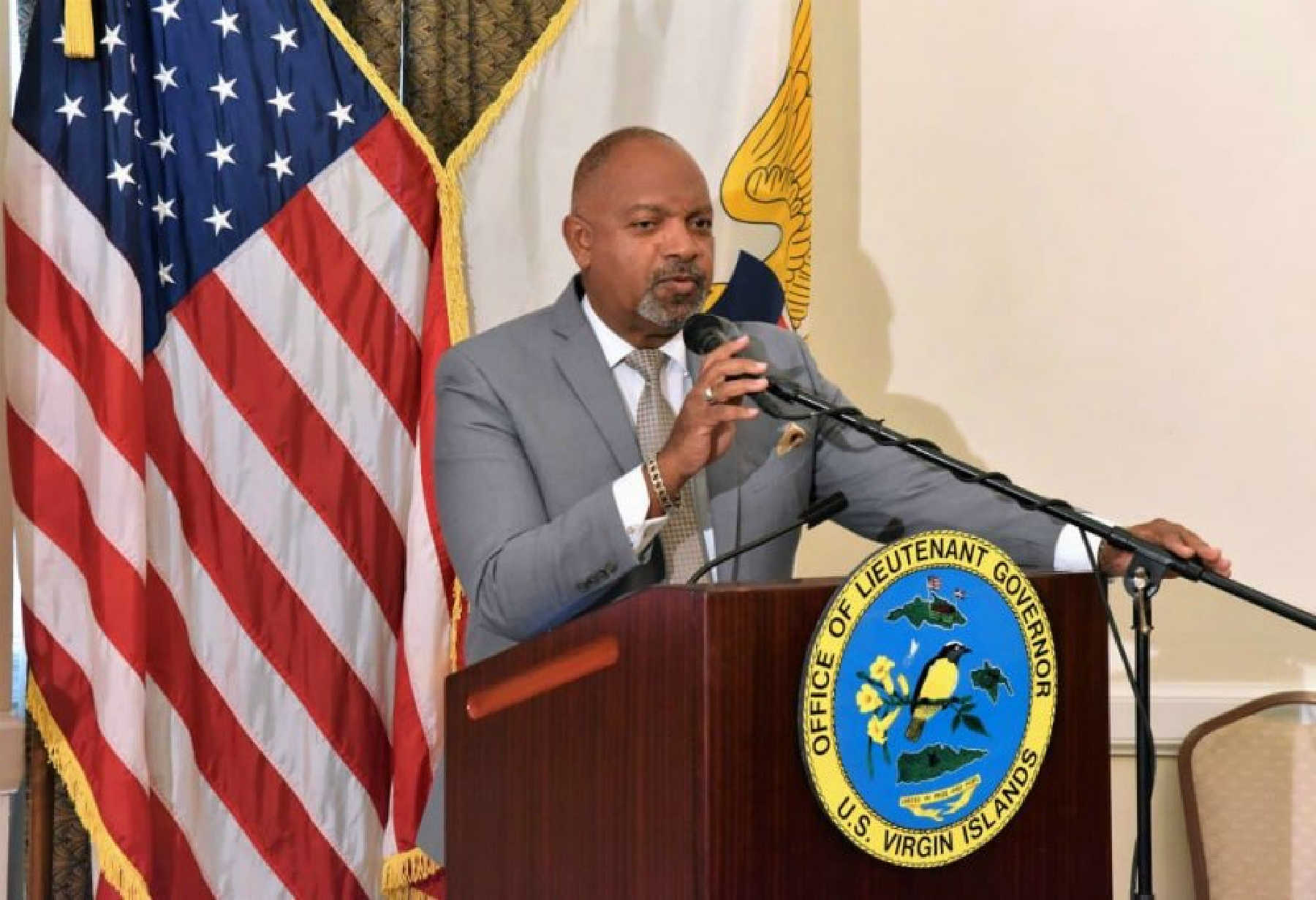Economy
Survey Unveils Strategies to Bolster USVI’s Diminishing Labor Force

A recent labor force survey in the U.S. Virgin Islands highlights several strategies to strengthen and expand the territory’s shrinking workforce.
Economic disruptions from the 2017 hurricanes, the closure of the Limetree Bay refinery, and the Covid-19 pandemic have led to a declining population, reducing the available labor pool. Currently, the unemployment rate stands at approximately 3.2 percent.
The survey results, presented to the Committee of Education and Workforce Development by Collin Perciballi, a consultant with labor market analytics firm Lightcast, identified key approaches to address these challenges. Perciballi emphasized the importance of aligning career and technical education with cross-cutting skills, advocating for a workforce trained to be flexible and capable of filling various roles. Additionally, foundational skills, including computer literacy, should be integrated into K-12 and adult education programs.
Addressing the “enrollment decline” in schools, a byproduct of population decrease, is also crucial. Lightcast recommended offering scholarships to Virgin Islander families who have moved away.
High living costs, particularly energy expenses, deter people from returning to the territory. Perciballi noted that reducing these costs could encourage repatriation and expand the workforce pipeline. Energy, healthcare, and education gaps have long been barriers for Virgin Islanders in the diaspora.
Labor Commissioner Gary Molloy described the current job market, where available positions outnumber available workers, as a “job seekers market.” With over 6,000 workers in the public sector, Lightcast’s report suggested transitioning talent to the private sector without layoffs, proposing that for every new government hire, two positions should transition to the private sector.
Lightcast also urged the territory’s leaders to facilitate entrepreneurship by removing processing delays and high fees associated with starting businesses. They recommended a comprehensive regulatory review and overhaul.
The consultants advocated for establishing a remote work culture, suggesting policies to make the Virgin Islands a remote-friendly destination. This could attract talent to the territory.
Additionally, workforce development should target forward-looking sectors such as the blue and green economy and tourism. Training in solar energy maintenance and agro-processing can support these industries. Financial services, particularly on St. John, also hold promise.
With an aging population, there will be an increased demand for retirement and healthcare services. Lightcast suggested long-term care initiatives and training nurses to support the University of the Virgin Islands’ nursing faculty shortage.
Contracted by the Virgin Islands Workforce Development Board, Lightcast’s study aims to meet U.S. Department of Labor requirements to evaluate the territory’s labor market. Board Chair Michael Carty emphasized that the territory is at a pivotal moment and that comprehensive workforce development strategies are essential for sustainable growth.
Actionable solutions, he noted, will bridge gaps, attract talent, and bolster sector resilience.
Economy
Economic Development Projects in the U.S. Virgin Islands

Economic development in the U.S. Virgin Islands is gaining momentum, driven by strategic plans to diversify and strengthen the local economy. One of the cornerstones of these efforts is “Vision 2040,” a comprehensive 20-year plan designed to transform the territory’s economy. Developed by the Virgin Islands Economic Development Authority (VIEDA) and with input from over 3,000 residents and stakeholders, this plan aims to make the territory a hub for various industries, including tourism, renewable energy, agriculture, and technology).
Vision 2040 is structured around several key sectors: coastal and ocean resources, health sciences, light manufacturing, professional services, and renewable energy. By 2040, the territory aims to increase employment by 35%, translating into the creation of over 52,000 jobs. This initiative focuses on modernizing infrastructure, enhancing workforce skills, and developing policies to attract international investments and support local entrepreneurship.
In addition to Vision 2040, several specific development projects are already underway. For example, the reopening of the Frenchman’s Reef Resort on St. Thomas, after significant renovations, will inject new life into the tourism sector, one of the territory’s key economic pillars. The $428 million investment is expected to create over 400 rooms, 10 dining outlets, and 60,000 square feet of event space, positioning the resort as a premier destination in the Caribbean.
The territory is also benefiting from programs like the State Small Business Credit Initiative (SSBCI), which provides up to $57.8 million in funding to local businesses. The SSBCI offers loan participation, loan guarantee, and collateral support programs to help businesses expand, create jobs, and secure financing for projects that may have otherwise struggled to receive support). These programs are critical for sustaining small and mid-sized enterprises, which are vital to the economic fabric of the islands.
Furthermore, the South Shore Trade Zone on St. Croix, another crucial project, is being developed to bolster the manufacturing and trade sectors. This zone is expected to enhance the island’s logistics capabilities, attracting more industrial investments and creating jobs.
Collectively, these projects and initiatives aim to create a diverse and sustainable economy that reduces dependence on tourism and positions the islands as a competitive business destination. By fostering growth in renewable energy, technology, and other sectors, the territory is setting the foundation for long-term economic stability.
The combination of long-term strategies like Vision 2040, targeted investments in key industries, and financial support for small businesses all point toward a brighter economic future for the Virgin Islands.
Economy
The Money Transfer Revolution: Unmasking the New Age of Financial Services

A Shift from Traditional Banking
A new era of financial services is emerging, diverging significantly from traditional banking institutions. These services, known as Money Transmission businesses, are licensed by individual states and operate under distinct regulations. Unlike conventional banks, these entities, such as Wise.com, offer unique advantages and face different challenges, reshaping how consumers and businesses manage their financial transactions.
Understanding Money Transmission Businesses
Money Transmission businesses, unlike banks, do not take deposits or offer loans. Instead, they specialize in transferring money and providing currency exchange services. These companies are licensed and regulated by state authorities rather than federal banking regulators. This distinction is crucial as it means they are subject to different oversight and consumer protection laws.
However, the lines between banks and Money Transmission businesses can blur for consumers, leading to potential confusion. Wise.com, for instance, offers services that closely resemble traditional banking functions. Customers can hold money in multiple currencies, receive local bank details (such as an ACH and routing number for the US), and even use a Wise debit card to spend their money globally. These features might lead a consumer to believe that Wise operates like a traditional bank, providing the same level of security and regulatory oversight.
On Wise’s website, the emphasis on ease of transferring and holding money across borders is prominent. They highlight the ability to receive money in various currencies with local account details, pay bills using the balance, and convert currencies at competitive rates. The site even mentions features like Direct Debit, which further blurs the lines between a traditional bank and a Money Transmission business. While these offerings are convenient, they do not carry the same protections as deposits in a traditional bank insured by the Federal Deposit Insurance Corporation (FDIC).
Potential Customer Confusion
A potential customer visiting Wise’s website might easily mistake it for a bank due to the following reasons:
- Holding Money: Wise allows users to hold a balance in multiple currencies, similar to a multi-currency bank account.
- Local Account Details: Wise provides local bank details, such as an ACH and routing number in the US, IBAN in Europe, and account numbers in other regions.
- Direct Debit and Bill Pay: These functionalities are typical of traditional banks, adding to the confusion.
- Debit Card: The provision of a Wise debit card, which can be used globally, mimics the services offered by banks.
The marketing language used on the site emphasizes ease, convenience, and global accessibility, which are appealing traits typically associated with banks. However, the site does not prominently clarify that Wise is not a bank and that the funds held are not covered by FDIC insurance or similar protections available to bank deposits.
Comparison with Other Money Transmission Businesses

Comparing Wise with other Money Transmission businesses like Western Union and MoneyGram helps to highlight these differences. Western Union and MoneyGram are clearly positioned as money transfer services, focusing on sending and receiving money quickly across borders. Their services are typically one-off transactions rather than ongoing account management.
Western Union and MoneyGram do not offer account holding capabilities or local bank details for receiving payments. Their marketing materials clearly define their role as facilitators of money transfers, which helps set accurate customer expectations about the level of service and protection provided.
Significant Scrutiny and Criticism
Wise, formerly known as TransferWise, is a prominent example of a Money Transmission business. Founded in 2011, Wise has quickly grown into a global financial technology company, processing billions in cross-border transactions each month. However, with their rise, these companies have also faced significant scrutiny and criticism.
Wise leverages advanced technology, including artificial intelligence (AI) and machine learning (ML), for fraud detection and compliance with anti-money laundering (AML) regulations. According to Wise’s submission to the Office of the Comptroller of the Currency, AI and ML enable them to identify risky behavior more effectively and quickly, thereby protecting customers and the financial system from fraud.
Despite these advancements, Wise has faced numerous customer complaints about account deactivations and fund withdrawals. Several online groups, including a Facebook group titled “Wise (Transferwise) Scam Victims,” have surfaced, where members share their grievances about the company. With 18.8K members, this group highlights the widespread dissatisfaction among some users.
Dylan Fenderson, a member of this group, shared his experience: “My Wise account was deactivated without notice with $16,000 in the balance. Ever since, I’ve been calling them every day to get an update on when I’ll receive my funds. I learned from this group that calling them was ineffective and that I needed to file a complaint. I filed a complaint with the CFPB on the 21st, and they contacted me this morning letting me know that I’d be refunded. I’ve already received my funds and I’m glad this is over.”
Jill Arcaro Gordon, another member, expressed her concern: “I have almost $80,000 in my personal Wise account. It’s my life’s savings.” These complaints range from lack of transparency and communication to accusations of Wise stealing their money.
A Wise spokesperson responded, “We never take the decision to deactivate an account lightly, and this is always the result of a thorough review by our team. Throughout, we keep the customer informed of the process. If our decision to close an account is final, we work with customers to ensure any money left in their account can be returned to an account of their choice. If a customer disagrees with our decision, we encourage them to take their case to their local complaints body.”
Regulatory and Legal Challenges
In addition to customer complaints, Wise has also faced legal and regulatory challenges. In 2021, Alexandra Leonards of FS Tech reported that Wise was accused by its former Brazilian banking partner, MS BANK, of using customers’ names and financial data to illegally send money abroad. MS BANK claimed that Wise had “defrauded international transfers” without its knowledge, involving customer names in illegal activities that could lead to prison sentences of up to six years.
MS BANK terminated its partnership with Wise and reported the alleged fraud to the Federal Public Ministry. The bank stated, “MS BANK communicated to the central bank about non-conformities in the values of some operations carried out via TransferWise and after an internal investigation by the Central Bank and the Federal Revenue, it was confirmed that TransferWise changed foreign currency quotes to send illegal money abroad with a ride with remittances platform customers.”
Wise responded by stating that MS BANK ended its partnership without prior notice at the same time as the launch of the bank’s own transfer service. Wise further claimed that the public accusations were timed to raise awareness of the competing product. “We are not aware of any formal investigation against TransferWise by any regulator or other authority, either in Brazil or anywhere else,” said Wise in a statement. They added that they are taking legal measures to resolve the matter with MS BANK.
Consumer Protection and Trust Issues
The rise of Money Transmission businesses like Wise has brought to light significant issues regarding consumer protection and trust. While these companies offer innovative solutions and competitive exchange rates, their regulatory framework differs markedly from traditional banks, leading to potential risks for consumers.
The Better Business Bureau (BBB) has given Wise an F rating, indicating a significant number of unresolved complaints. CNBC also reported that Wise’s CEO and co-founder, Kristo Kaarmann, was recently fined £365,651 by U.K. tax officials for defaulting on his taxes.
Moreover, former employees have voiced concerns about the company’s internal environment, describing it as having a “terrible structure and a toxic work environment.” One employee mentioned, “Team leads are so over it that they don’t bother to support people underneath them, especially newbies. Constant changes to work procedures, with customer support facing the brunt of the consequences.”
Another employee added, “It’s honestly the worst place I’ve ever worked for and I regret to this day having accepted that job. My mental health was heavily affected with panic attacks, insomnia, stress, and depression.”
The Role of AI and ML in Financial Services
Despite these challenges, AI and ML remain integral to the operations of Money Transmission businesses. Wise has highlighted how these technologies help them combat financial crime more effectively than traditional methods. However, they also acknowledge that outdated regulations and explainability requirements can hinder the full potential of these technologies.
In their comments to financial regulators, Wise emphasized the need for modernized guidelines and increased information sharing to enhance the effectiveness of AI/ML in fighting financial crime. They argued that static rules based on current regulatory frameworks are insufficient to tackle advanced financial criminals, who continuously evolve their methods.
Wise explained, “Our fraud and anti-money laundering (AML) control functions use ML. Our ML system uses over 110 data points, with each data point assigned a risk aspect. When a customer displays certain behavior, our system flags this as suspicious and creates cases for our internal investigations team. Our investigations team reviews the case, and if financial crime is found to be occurring, the customer is quickly offboarded and we file a Suspicious Activity Report (SAR). Our series of ML rules have scaled along with Wise’s own growth, which has resulted in more advanced customers and businesses with more complex typologies. This also means we are a target of more advanced financial crime, necessitating a more advanced and quickly evolving system.”
Unintended Harm to Customers
While AI and ML offer substantial benefits, they also pose risks, particularly when customers are inadvertently harmed by automated systems. Wise’s AI-driven system uses over 110 data points to assess risk, but this can lead to false positives, where legitimate customers are flagged as suspicious. This often results in account deactivations without prior notice, leaving customers without access to their funds.
Wise explained that their ML system is designed to learn from current cases and focus on attributes that create reasonable suspicion. However, this can mean that customers who do not fit neatly into predefined categories are unfairly targeted. “We have concerns that outdated regulations and explainability requirements continue to negatively impact our model’s effectiveness and our ability to quickly adapt to new risks,” Wise stated in their letter to regulators.
The reliance on AI/ML can sometimes prioritize efficiency and cost-saving over customer experience. Automated decisions can lack the nuance and empathy that human intervention might provide. This has led to numerous complaints from Wise customers who feel that their lives are taking a backseat to the company’s bottom line.
Dylan Fenderson’s case, where he had to file a complaint with the CFPB to retrieve his funds, underscores this issue. Despite Wise’s assurances that they work with customers to return their money, many feel that the process is opaque and overly bureaucratic.
AI and ML: Beneficial but Risky
The integration of AI and ML into financial services brings numerous advantages, but it also introduces complexities that need careful management. Wise incorporates these technologies to enhance their fraud detection and AML processes. According to Wise, “AI/ML allows us to more comprehensively consider risk factors and our customers’ transactions, leading to faster identification of risky behavior while lessening impact on good customers.”
However, Wise also acknowledges the challenges. “We have concerns, however, that outdated regulations and explainability requirements continue to negatively impact our model’s effectiveness and our ability to quickly adapt to new risks.”
Regulatory Landscape and Future Directions
The financial services sector is at a crossroads, balancing innovation with consumer protection. Wise’s use of AI/ML highlights both the potential and the pitfalls of modern financial technology. As regulatory bodies like the OCC, Federal Reserve, and CFPB consider updates to their guidelines, the need for clear, adaptable regulations becomes evident.
Wise has called for a co-evolution of understanding ML and using it for financial crime, along with the ability to explain the safety and soundness of these systems to regulators. They advocate for dynamic updating techniques to replace static rules, which they believe are ill-equipped to handle sophisticated financial crime.
Additionally, Wise has stressed the importance of increased information sharing between financial institutions and law enforcement to build more efficient and accurate AI/ML algorithms. They believe that a comprehensive database provided by law enforcement, combined with a framework for data sharing among financial institutions, could vastly improve controls to detect and fight crime.
Navigating the Future of Financial Services
As Money Transmission businesses continue to grow, it is crucial for consumers to understand the differences between these companies and traditional banks. While they offer innovative and cost-effective solutions for international money transfers, they also operate under different regulatory frameworks, which can impact consumer protection and trust.
USVI News & World Report will continue to investigate and report on these emerging financial services, providing readers with the information they need to make informed decisions. In the next part of this series, we will delve deeper into the regulatory landscape and the measures being taken to protect consumers in this new age of financial services.
Sources
- Wise’s submission to the Office of the Comptroller of the Currency.
- “Wise (Transferwise) Scam Victims” Facebook group.
- Statement from Dylan Fenderson, member of “Wise (Transferwise) Scam Victims” Facebook group.
- Statement from Jill Arcaro Gordon, member of “Wise (Transferwise) Scam Victims” Facebook group.
- Response from a Wise spokesperson.
- Glassdoor Employee Reviews
- Alexandra Leonards, FS Tech, 2021.
- The Better Business Bureau (BBB) rating for Wise.
- CNBC report on Wise’s CEO Kristo Kaarmann’s fine by U.K. tax officials.
- Comments from former Wise employees.
Tags
#MoneyTransfer #FinancialServices #BankingRevolution #ModernBanking #Wise #DigitalFinance #ConsumerProtection #AIinFinance #USVINews #GlobalConnectivity #FinancialTechnology #FinTech #TraditionalBanking #MoneyTransmission #FinanceInnovation
Economy
Lt. Governor Tregenza A. Roach Participates in NAIC Southeastern Zone Meeting

Lieutenant Governor Tregenza A. Roach embarked on a journey from the U.S. Virgin Islands to Jackson, Mississippi, earlier this week. He attended the National Association of Insurance Commissioners (NAIC) Southeastern Zone Business Meeting in his capacity as the commissioner of insurance for the U.S. Virgin Islands.
As a dedicated member of the NAIC, Roach is actively engaged in a series of conferences, training sessions, and meetings that the association funds. This involvement underscores his commitment to effectively regulating the insurance industry and safeguarding consumer interests.
The NAIC plays a crucial role by equipping insurance commissioners from the 50 states, the District of Columbia, and five U.S. territories, including the Virgin Islands, with necessary expertise, data, and analytical tools. These resources help in setting standards and ensuring effective governance within the industry.
The focus of the Southeastern Zone meeting is to address issues relevant to the regions represented within the zone. Commissioners, grouped by geographic zones, convene periodically to deliberate on challenges and opportunities unique to their respective areas, promoting a collaborative approach to problem-solving.
Lieutenant Governor Roach is scheduled to return to the territory on Thursday, May 9, 2024. During his absence, Senate President Novelle E. Francis, Jr. will perform the duties of the Lieutenant Governor as stipulated by the Revised Organic Act of the Virgin Islands.
-

 Education1 year ago
Education1 year agoEducation Board Seeks Input on Schools Through Comprehensive Survey
-

 Education2 years ago
Education2 years agoCTE Board Enthusiastic About New Curriculum Standards, Yet Anxious Over Apprenticeship Support
-

 Crime2 years ago
Crime2 years agoRegistered Sex Offender Detained for Illegal Firearm Possession During Annual Surveillance Drive
-

 Development1 year ago
Development1 year agoCosts Surge as Donoe Estates Housing Project Resumes with New Contractor
-

 Videos3 years ago
Videos3 years ago2022 Gubernatorial Election: Voters Speak Out
-

 Videos3 years ago
Videos3 years agoGubernatorial Teams Celebrate St. Croix’s Bull & Bread Day
-

 Videos3 years ago
Videos3 years agoWakanda’s Female Might: A Dive into ‘Black Panther: Wakanda Forever’
-

 Crime2 years ago
Crime2 years agoSt. John’s Westin Resort Scene of Armed Robbery, Prompting Heightened Police Vigilance




